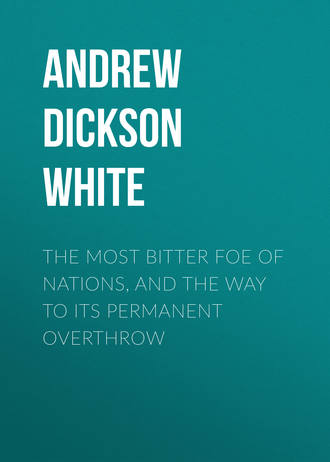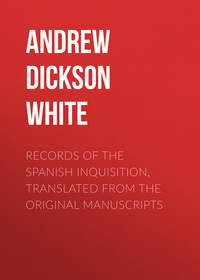 полная версия
полная версияThe Most Bitter Foe of Nations, and the Way to Its Permanent Overthrow

Andrew Dickson White
The Most Bitter Foe of Nations, and the Way to Its Permanent Overthrow
Dear Sir,
The undersigned have been appointed by the Phi Beta Kappa Society a Committee to render you the cordial thanks of the Society for your admirable Address, delivered last evening, and to request a copy for the Press.
Respectfully and truly yours,A. C. TWINING,G. P. FISHER.Professor White.
State of New York,Senate Chamber,Albany, Aug. 30th, 1866.Gentlemen,
Accept my thanks for the very kind expressions regarding the Address which, in accordance with the request conveyed by you, I forward herewith.
With great respect,Very truly yours,A. D. WHITE.Professors A. C. Twining and
G. P. Fisher.
ADDRESS
In this sacred struggle and battle of so many hundred years,—this weary struggle of truths to be recognized,—this desperate battle of rights to be allowed;—in this long, broad current toward more truth and more right, in which are seen the hands of so many good and bad and indifferent men,—and in the midst of all, and surrounding all, the hand of very God,—what political institution has been most vigorous against this current,—what political system has been most noxious to political truth and right?—in short, what foe, in every land, have right and liberty found it hardest to fight or outwit?
Is it Ecclesiasticism?—is it Despotism?—is it Aristocracy?—is it Democracy?
The time allotted me this evening I shall devote to maintaining the following Thesis:
Of all systems and institutions, the most vigorous in battling Liberty,—the most noxious in adulterating Right,—the most corrosive in eating out Nationality, has been an Aristocracy based upon habits or traditions of oppression.
I shall also attempt to deduce from the proofs of this a corollary, showing the only way in which such an Aristocracy ever has been or ever can be fought successfully and put down permanently.
Let me first give this Thesis precision.
I do not say that Aristocracy, based upon habits and traditions of oppression, is the foe which takes deepest hold;—Despotism and Ecclesiasticism are dragons which get their claws far deeper into the body politic;—for Despotism clutches more temporal, and Ecclesiasticism more eternal interests.
Nor do I say that Aristocracy is the enemy most difficult to find and come at. Demoralization in Democracy is harder to find and come at; for demoralization in Democracy is a disease, and lurks,—Aristocracy is a foe, and stands forth—bold; Demoralization is latent, and political doctors disagree about it,—Aristocracy is patent, and men of average sense soon agree about it.
But the statement is that Aristocracy, based upon oppression, is, of all foes to liberty the most vigorous, of all foes to rights the most noxious, and of all foes to nationality the most corrosive.
Other battles may be longer;—but the battle with Aristocracy is the sharpest which a nation can be called upon to wage,—and as a nation uses its strength during the contest—and as it uses its wits after the contest—so shall you find its whole national life a success or a failure.
For my proofs I shall not start with a priori reasoning:—that shall come in as it is needed in the examination of historical facts. You shall have the simple, accurate presentation of facts from history—and plain reasoning upon these facts—and from Ancient History, rich as it is in proofs, I will draw nothing!—all shall be drawn from the history of modern States—the history of men living under the influence of great religious and political ideas which are active to-day—and among ourselves.
Foremost among the examples of the normal working of an Aristocracy based upon the subjection of a class, I name Spain. I name her first—not as the most striking example, but as one of those in which the evil grew most naturally, and went through its various noxious phases most regularly.
The fabric of Spanish nationality had much strength and much beauty. The mixture of the Barbarian element with the Roman, after the Roman downfall, was probably happier there than in any other part of Europe. The Visigoths gave Spain the best of all the barbaric codes. Guizot has shown how,1 as by inspiration, some of the most advanced ideas of modern enlightened codes were incorporated into it.
The succeeding history of the Spanish nation was also, in its main sweep, fortunate. There were ages of endurance which toughened the growing nation,—battles for right which ennobled it;—disasters which compacted manliness and squeezed out effeminacy.
This character took shape in goodly institutions. The city growth helped the growth of liberty, not less in Spain than in her sister nations. Cities and towns became not merely centres of prosperity, but guardians of freedom.2
Then came, perhaps, the finest growth of free institutions in Mediæval Europe.
The Cortes of Castile was a representative body nearly a hundred years before Simon de Montfort laid the foundations of English parliamentary representation at Leicester.3 The Commons of Arragon had gained yet greater privileges earlier.
Statesmen sat in these—statesmen who devised curbs for monarchs, and forced monarchs to wear them. The dispensing power was claimed at an early day by Spanish Kings as by Kings of England;—but Hallam acknowledges4 that the Spaniards made a better fight against this despotic claim than did the English. The Spanish established the Constitutional principle that the King cannot dispense with statutes centuries before the English established it by the final overthrow of the Stuarts.
Many sturdy maxims, generally accounted fruit of that early English boldness for liberty, are of that earlier Spanish period. "No taxation without representation" was a principle asserted in Castile early, often and to good purpose. In Arragon no war could be declared,—no peace made,—no money coined without consent of the Cortes.5
The "Great Privilege of Saragossa" gave quite as many, and quite as important liberties to Arragon as were wrested from King John for England in the same century.
Such is a meagre sketch of the development of society at large. As regards the other development which goes to produce civilization—the development of individual character, the Spanish peninsula was not less distinguished. In its line of monarchs were Ferdinand III., Alfonso X., James II., and Isabella;—in its line of statesmen were Ximenes and Cisneros—worthy predecessors of that most daring of all modern statesmen, Alberoni. The nation rejoiced too in a noble line of poets and men of letters.6
Still more important than these brilliant exceptions was the tone of the people at large. They were tough and manly.7
No doubt there were grave national faults. Pride—national and individual—constantly endangered quiet. Blind submission to Ecclesiastical authority was also a fearful source of evil! Yet, despite these, it is impossible not to be convinced, on a careful reading of Spanish history, that the influence which tore apart States,—which undermined good institutions,—which defeated justice,—which disheartened effort,—which prevented resistance to encroachments of Ecclesiasticism and Despotism—nay, which made such encroachments a necessity—came from the nobility.
The Spanish nobility had risen and become strong in those long wars against the intruding Moors,—they had gained additional strength in the wars between provinces. They soon manifested necessary characteristics. They kept Castile in confusion by their dissensions,—they kept Arragon in confusion by their anti-governmental unions.
Accustomed to lord it over inferiors, they could brook no opposition,—hence all their influence was Anarchic; accustomed to no profitable labor of any sort, their influence was for laziness and wastefulness;—accustomed to look on public matters as their monopoly, they devoted themselves to conjuring up phantoms of injuries and insults, and plotting to avenge them.
Every Aristocracy passes through one, and most Aristocracies through both of two historic phases.
The first may be called the Vitriolic,—the period of intense, biting, corrosive activity,—the period in which it gnaws fiercely into all institutions with which it comes into contact,—the period in which it decomposes all elements of nationality.
In Spain this first period was early developed and long continued. Grandees and nobles bit and cut their way into the Legislative system,—by brute force, too, they crushed their way through the Judicial system,—by judicious mixtures of cheating and bullying they often controlled the Executive system.
Chapter after chapter of Mariana's history begins with the story of their turbulence, and ends with the story of its sad results;—how the nobles seized King James of Arragon;—how the Lara family usurped the Government of Castile;—how the houses of Lara, Haro, Castro and their peers are constantly concocting some plot, or doing some act to overthrow all governmental stability.
But their warfare was not merely upon Government and upon each other;—it was upon the people at large. Out from their midst comes a constant voice of indignant petitions. These are not merely petitions from serfs. No! history written in stately style has given small place to their cries;—but the great flood of petitions and remonstrances comes from the substantial middle class, who saw this domineering upper class trampling out every germ of commercial and manufacturing prosperity.
Such was the current of Spanish history. I now single out certain aristocratic characteristics bedded in it which made its flow so turbulent.
Foremost of these was that first and most fatal characteristic of all aristocracies based on oppression—the erection of a substitute for patriotism.
Devotion to caste, in such circumstances, always eats out love of country. A nobility often fight for their country—often die for it;—but in any supreme national emergency,—at any moment of moments in national history the rule is that you are sure to find them asking—not "What is my duty to my country?" but "What is my duty to my order?"
Every crisis in Spanish history shows this characteristic,—take one example to show the strength of it.
Charles the Fifth was the most terrible of all monarchic foes to the old Spanish institutions. The nobles disliked him for this. They also disliked him still more as a foreigner. Most of all they disliked him because the tools he used in overturning Spain were foreigners.
Against this detested policy the cities of the kingdom planned a policy thoughtful and effectual. Cardinal Cisneros favored it,—the only thing needed was the conjunction of the nobles. They seemed favorable—but at the supreme moment they wavered. The interest of the country was clear;—but how as to the interests of their order? They began by fearing encroachments of the people;—they ended by becoming traitors, allowed the battle of Villalar to be lost—and with it the last chance of curbing their most terrible enemy.8
Another characteristic was the development of a substitute for political morality.
These nobles were brave. The chronicles gave them plentiful supply of chivalric maxims, and they carried these out into chivalric practices. Their quickness in throwing about them the robes of chivalry was only excelled by their quickness in throwing off the garb of ordinary political morality. They could die for an idea, yet we constantly see among them acts of bad faith—petty and large—only befitting savages.
John Alonzo de la Cerda, by the will of the late King, had been deprived of a certain office; he therefore betrays the stronghold of Myorga to the new King's enemies.9 Don Alonzo de Lara had caused great distress by his turbulence. Queen Berengaria writes an account of it to the King. Don Alonzo does not scruple to waylay the messenger, murder him, and substitute for the true message a forgery, containing an order in the Queen's hand for the King's murder.10 Of such warp and woof is the history of the Spanish aristocracy—the history of nobles whose boast was their chivalry.
How is this to be accounted for? Mainly by the fact, I think, that the pride engendered by lording it over a subject class lifts men above ordinary morality. If commonplace truth and vulgar good faith fetter that morbid will-power which serf-owning gives, truth and good faith must be rent asunder.
The next characteristic was the erection of a theory of easy treason and perpetual anarchy.
Prescott calls this whimsical; he might more justly have called it frightful.
For this theory, which they asserted, maintained, and finally brought into the national notion and custom was, that in case they were aggrieved—themselves being judges—they could renounce their allegiance, join the bitterest foes of king and nation,—plot and fight against their country,—deluge the land in blood,—deplete the treasury; and yet that the King should take care of the families they left behind, and in other ways make treason pastime.
Spanish history is black with the consequences of this theory. Mariana drops a casual expression in his history which shows the natural result, when he says: "The Castro family were much in the habit of revolting and going over to the Moors."11
The absurdity of this theory was only equaled by its iniquity.
For it involved three ideas absolutely fatal to any State—the right of peaceable secession—the right of judging in their own cause, and the right of committing treason with impunity. Now, any nation which does not, when stung by such a theory, throttle it, and stamp the life out of it, is doomed.
Spain did not grapple with it. She tampered with it, truckled to it, compromised with it.
This nursed another characteristic in her nobility, which is sure to be developed always under like circumstances. This characteristic was an aristocratic inability to appreciate concessions.
The ordinary sort of poor statesmanship which afflicts this world generally meets the assumptions and treasons of a man-mastering caste by concessions. The commercial and manufacturing classes love peace and applaud concessions. But concessions only make matters worse. Concessions to a caste, based upon traditions of oppression, are but fuel to fire. The more privileges are given, the higher blazes its pride, and pride is one of the greatest causes of its noxious activity. Concessions to such a caste are sure to be received as tributes to its superiority. Such concessions are regarded by it not as favors but as rights, and no man ever owed gratitude for a right.
There remained then but one way of dealing with it,—that was by overwhelming force; and at the end of the Fifteenth Century that force appeared. The encroachments upon regular central government produced the same results in Spain as in the rest of Europe at about the same time.
To one not acquainted with previous history, but looking thoughtfully at the fifteenth century, it must seem strange that just at that time—as by a simultaneous and spontaneous movement—almost every nation in Europe consolidated power in the hands of a monarch. In France, in England, in Italy, as well as in Spain, you see institutions, liberties, franchises, boundaries sacrificed freely to establish despotism. You see Henry VII. in England, Louis XI. in France, Charles V., a little later, in Germany and Italy, Ferdinand and Isabella in Spain—almost all utterly unlovely and unloved—allowed to build up despotisms in all cases severe, and in most cases cruel. Why? Because the serf-owning caste had become utterly unbearable; because one tyrant is better than a thousand.
Then the Spanish nobility went into the next phase. Ferdinand, Charles the Fifth, Philip the Second—three of the harshest tyrants known to history,—having crushed out the boldness and enterprise of the aristocracy it passed from what I have called the Vitriolic into what might be called the Narcotic period.
A period this was in which the noble became an agent in stimulating all evil tendencies in the monarch, and in stupefying all good tendencies in the people.
The caste spirit was a drug infused into the body politic, rendering inert all its powers for good. Did Charles the Fifth insult and depose Ximenes,—the nation sleepily permitted it; did Philip the Second lay bigot plans which brought the kingdom to ruin,—the nation lazily fawned upon him for it;12 did Philip III. and his successors allow the nation to sink into contempt,—there was no voice to raise it.
Do you say that this resulted from Ecclesiasticism? I answer that the main reason why Ecclesiasticism became so strong was because it sheltered the lower class from the exactions of the Aristocracy. Do you say that it resulted from Despotism? I answer that Despotism became absolute in order to save the nation from the turbulence of the Aristocracy.13
No single Despotism, either in Church or State, could by itself have broken that well-knit system of old Spanish liberties. It was the growth of an oppressive caste, who by their spirit of disunion made Despotism possible, and by their spirit of turbulence made it necessary.
The next nation in which I would show the working of a caste with traditions of oppression is Italy.
Man-owners had cost Italy dear already. Roman serf-culture had withered all prosperity in the country; slave service had eaten out all manliness from the city.
It is one of the most pregnant facts in history, and one which, so far as I know, has never been noted, that whereas the multitude who have written upon the subject have assigned innumerable causes for the decline and downfall of the Roman nation, not one of any note has failed to name, as a cause, Roman slavery. As to other causes they disagree—on this alone all agree.
The philosophers Montesquieu14 and Gibbon,15 the economist Sismondi,16 the doctrinaire Guizot,17 the republican Michelet,18 the eclectic Schlosser,19 high tory Alison,20 moderate Merivale,21 democrat Bancroft,22 quasi conservative, quasi liberal Charles Kingsley,23 wide apart as the poles on all else, agree to name as a cause of Roman ruin the system of forced labor.
But after the Roman downfall the straggle of Italy with her upper caste seems singularly fortunate. At an early day her cities by commerce became rich and strong. Then in the natural course of things—first, free ideas, next, free institutions, next, war upon the nobles to make them respect these ideas and institutions.
The war of municipalities against nobles was successful. Elsewhere in Europe cities sheltered themselves behind lords; in Italy lords sheltered themselves in cities. Elsewhere the lord dwelt in the castle above the city; in Italy the lord was forced to dwell in his palace within the city.24
The victory of freedom seemed complete. The Italian republics were triumphant; the nobility were, to all appearance, subdued.
But those republics made a fearful mistake. They had a great chance to destroy caste and lost it. They allowed the old caste spirit to remain, and that evil leaven soon renewed its work. The republics showed generalship in war, but in peace they were outwitted.
First, the nobles insisted on pretended rights within the city, and stirred perpetual civil war to make these rights good.25
Beaten at this they had yet a worse influence. Those great free cities would not indeed allow the nobles to indulge in private wars, but gradually the cities caught the infection from the nobles. The cities caught their aristocratic spirit of jealousy,—took nobles as leaders,—ran into their modes of plotting and fighting, and what I have called the Vitriolic period set in.
Undoubtedly some of this propensity came from other causes, but the main cause was this domineering aristocracy in its midst, giving tone to its ideas. Free cities in other parts of Europe disliked each other,—a few fought each other,—but none with a tithe of the insane hate and rage shown by the city republics of Italy.26
Hence arose that political product sure to rise in every nation where an aristocracy shape policy, the Spirit of Disunion. Its curse has been upon Italy for five hundred years. Dante felt it when he sketched the torments of Riniero of Corneto and Riniero Pazzo,27 and the woes brought on Florence by the feuds of the Neri and Bianchi.28 Sismondi felt it when his thoughts of Italian disunion wrung from his liberty-loving heart a longing for Despotism.29 All Italy felt it when Genoa, in these last years, solemnly restored to Pisa the trophies gained in those old civil wars, and hung them up in the Campo Santo behind the bust of Cavour.
No other adequate reason for the chronic spirit of disunion in Italy than the oppressive aristocratic spirit can be given. Italy was blest with every influence for unity;—a most favorable position and conformation, boundaries sharply defined on three sides by seas and on the remaining side by lofty mountains, a great devotion to trade, a single great political tradition, a single great religious tradition, both drawing the nation toward one great central city.
Had Italy been left to herself without the disturbing influence of this chivalric, uneasy, plotting, fighting caste, who can doubt that petty rivalries would have been extinguished and all elements fused into a great, strong Nationality?
Turn from this history and construct such a society with your own reason. You shall find it all very simple. Put into energetic free cities or states a body of men accustomed to lord it over an inferior caste, whose main occupation is to brood over wrongs and to hatch revenges, and you ensure disunion between that state and sister states speedily. To such men every movement of a sister state is cause for suspicion, every betterment cause for quarrel.
But you ensure more than that. Under such circumstances disunion is always followed by disintegration. They are two inevitable stages of one disease. In the first stage the idea of country is lost; in the second, the idea of government is lost; disintegration is closely followed by Anarchy, and Despotism has generally been the only remedy.
To Italy in this strait despotism was the remedy. Disunion between all Italian Republics was followed by disintegration between factions in each Italian Republic. A multitude of city tyrants rose to remedy disintegration,—a single tyrant rose above all to remedy disunion.
These were welcomed because they at least mitigated anarchy. If a Visconti or a Sforza was bad at Milan, he was better than a multitude of tyrants. If the Scala were severe at Verona, they were less severe than the crowd of competitors whom they put down. If Rienzi was harsh at Rome, he was milder than the struggles of the Colonna and Orsini,—if the Duke of Athens was at once contemptible and terrible at Athens, he was neither so contemptible nor so terrible as the feuds of the Cerchi and Donati.
And when, at last, Charles the Fifth crushed all these seething polities into a compact despotism, that was better than disunion, disintegration and anarchy.
This compression of anarchic elements ended the Vitriolic period of Italian Aristocracy, but it brought on the Narcotic period. It was the most fearful reign of cruelty, debauchery and treachery between the orgies of Vitellius and De Sade.
Yet those debaucheries and murders among the Borgias and later Medici, and so many other leading families, were but types of what this second phase of an oppressive aristocracy must be.
For the domineering caste-spirit immediately on its repression breaks out in cruelty. This is historical, and a moment's thought will show you that it is logical. The development of the chivalric noble into the cruel schemer is very easily traced.
Given such a lordling forced to keep the peace, and you have a character which, if it resigns itself, sinks into debauchery—which, if it resists, flies into plotting. Now both the debauchee and the plotter regard bodies and souls of inferiors as mere counters in their games,—hence they must be cruel.30
I turn now to another nation where the serf-mastering spirit wrought out its fearful work in yet a different manner, and on a more gigantic scale,—in a manner so brilliant that it has dazzled the world for centuries, and blazoned its faults as virtues;—on a scale so great that it has sunk art, science, literature, education, commerce and manufactures,—brought misery upon its lower caste,—brought death upon its upper caste,—and has utterly removed its nation from modern geography, and its name from modern history. I point you to Poland.




